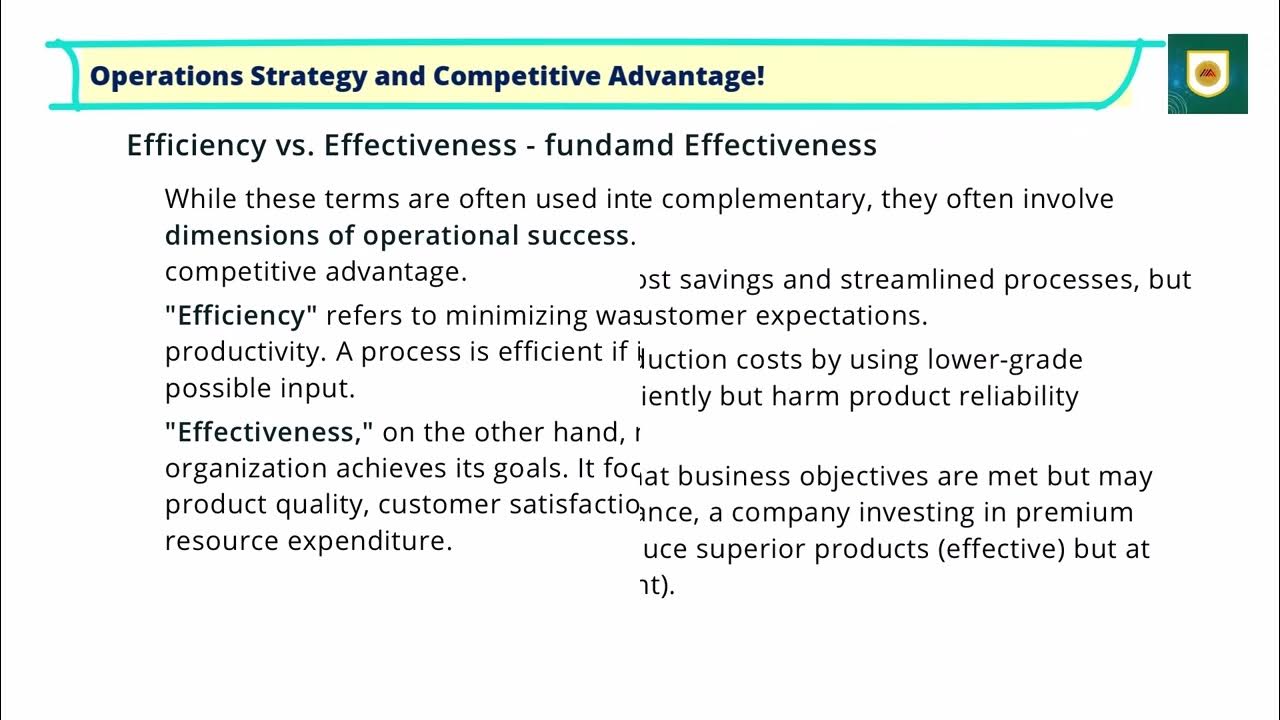Operational Effectiveness vs Strategy
Summary
TLDRThis mini-lecture differentiates between operational effectiveness and strategy in business. Operational effectiveness is about performing activities more efficiently than competitors, aiming for best practices in functional areas. In contrast, strategy is about making key choices, such as what products to offer and how to deliver them, that allow a company to position itself uniquely for long-term success. Both are essential for superior performance, but strategy ensures sustainable competitive advantage, as operational effectiveness alone can't provide lasting success. The key takeaway is that strategy involves doing the right things, while operational effectiveness focuses on doing things right.
Takeaways
- 😀 Operational effectiveness refers to performing activities as well as or better than rivals, striving for best practices across functional areas.
- 😀 Strategy is about making key choices: selecting the products to offer, identifying target customers, and deciding how to design, manufacture, and deliver products.
- 😀 A firm on the efficient frontier (e.g., Firm A) gets the most out of its resources, while a firm off the frontier (e.g., Firm B) could improve performance by enhancing operations.
- 😀 Operational effectiveness alone doesn't guarantee sustainable superior profits, as firms in the same position on the efficient frontier may face intense competition.
- 😀 Strategy involves choosing different positions on the efficient frontier to avoid direct competition, ensuring a unique market offering.
- 😀 Operational effectiveness focuses on doing things right, while strategy is about doing the right things to differentiate the business.
- 😀 Being operationally efficient is important but not sufficient for sustained competitive advantage or long-term success.
- 😀 Strategy requires decisions on where to position the firm on the efficient frontier, impacting the firm’s performance and market differentiation.
- 😀 Different functional areas like manufacturing, marketing, and sales all contribute to operational effectiveness, improving efficiency and resource use.
- 😀 Managers must recognize the type of decision they face, whether it’s operational or strategic, to properly formulate their approach and solve problems.
- 😀 Operational effectiveness is necessary for high performance, but strategic positioning is crucial for long-term, superior performance.
Q & A
What is operational effectiveness?
-Operational effectiveness refers to performing activities as well as, or better than rivals. It focuses on achieving best practices in functional areas such as manufacturing, marketing, sales, logistics, and service to optimize performance.
How does operational effectiveness relate to the efficient frontier?
-Operational effectiveness is about getting as much as possible out of the resources invested in a business. A firm on the efficient frontier (like firm A) is operating at its maximum potential, getting the best possible results from its resources. A firm not on the efficient frontier (like firm B) is underperforming and can improve by improving its functional areas.
What distinguishes strategy from operational effectiveness?
-Strategy is about making choices—deciding what products to offer, which customers to target, and how to design, manufacture, and deliver those products. While operational effectiveness focuses on doing things right, strategy focuses on doing the right things, often through unique activities that differentiate a firm from competitors.
What happens if two firms are on the same spot on the efficient frontier?
-If two firms (like firm A and firm B) are on the same spot on the efficient frontier, they would be competing aggressively for customers since they offer the same level of performance. This would make it difficult for them to sustain superior profits, as they lack uniqueness in their offerings.
What is the essence of strategy in business?
-The essence of strategy is choosing a unique position on the efficient frontier that sets a firm apart from competitors. This involves making strategic choices about products, customers, and operations, ensuring the firm does not simply replicate others in its industry.
How does operational effectiveness contribute to performance?
-Operational effectiveness is crucial for high performance as it ensures that a company is operating efficiently within its functional areas, reducing waste and optimizing resources. While it is necessary for success, it alone does not ensure superior performance without a solid strategy.
Why is strategic positioning important for long-term success?
-Strategic positioning is important because it allows a firm to differentiate itself from competitors, ensuring that it can sustain superior performance over time. Without strategic positioning, a firm may end up competing purely on efficiency, which can lead to lower profitability and customer loyalty.
What does it mean for a company to perform 'different activities than rivals'?
-Performing different activities than rivals means that a company takes a unique approach to its products, services, and operations. This could involve offering higher quality, targeting different customer segments, or creating distinctive products and processes that competitors do not replicate.
How should managers approach decisions regarding operational effectiveness versus strategy?
-Managers should distinguish between decisions focused on improving operational effectiveness (such as streamlining processes and reducing costs) and those focused on strategic choices (like selecting target markets and defining product offerings). Recognizing the type of decision is crucial for determining the appropriate approach.
What is the difference between performing 'similar activities' and 'different activities' in the context of strategy?
-Performing similar activities means matching competitors in operational efficiency, aiming for the best practices in common functions. In contrast, performing different activities involves creating unique offerings or business models that set a company apart, which is central to a firm's strategy.
Outlines

此内容仅限付费用户访问。 请升级后访问。
立即升级Mindmap

此内容仅限付费用户访问。 请升级后访问。
立即升级Keywords

此内容仅限付费用户访问。 请升级后访问。
立即升级Highlights

此内容仅限付费用户访问。 请升级后访问。
立即升级Transcripts

此内容仅限付费用户访问。 请升级后访问。
立即升级5.0 / 5 (0 votes)






